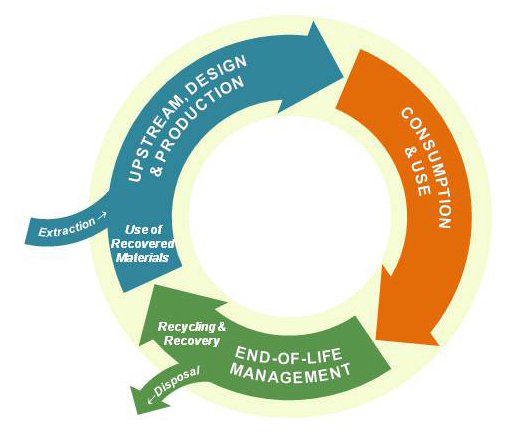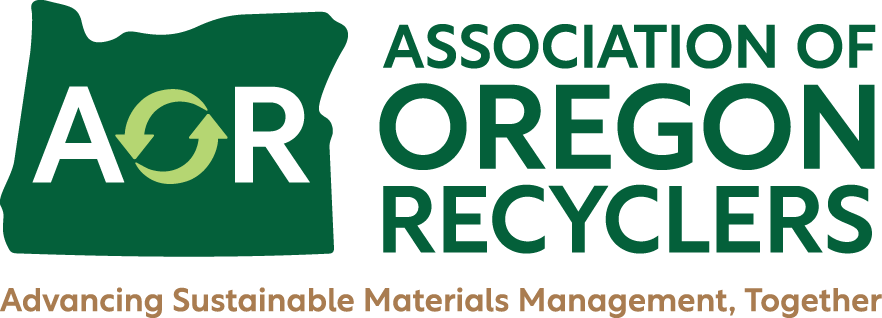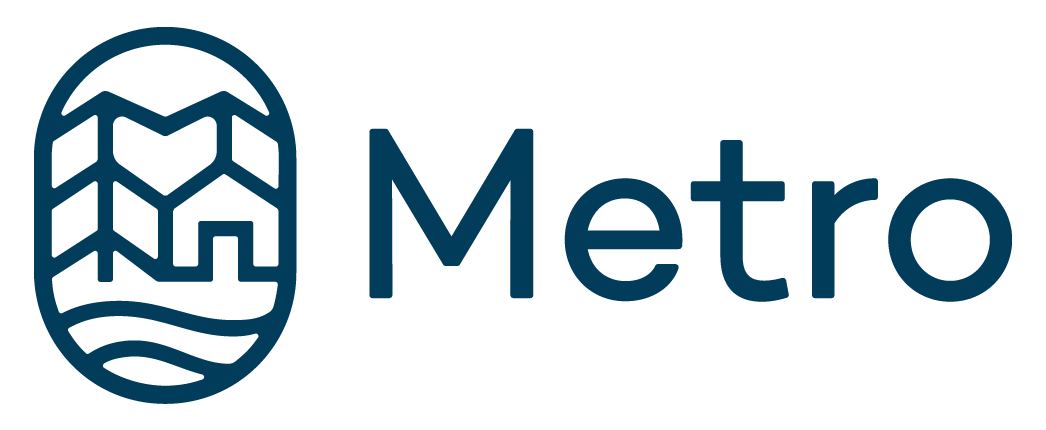Summary of DEQ's Webinar on Implementing SB 245, SB 263, and Materials Management in Oregon
 Following the recent enactment of Senate Bills 245 and 263, the Oregon Department of Environmental Quality (DEQ) hosted a webinar on July 16 to describe the “next steps” portion of the Materials Management 2050 Vision, a webinar over 120 participated in. For individuals new to our state industry, or those who lived in a cave or under a rock for the last several years, here's a little background on the 2050 Vision and why the passing of these two bills was important.
Following the recent enactment of Senate Bills 245 and 263, the Oregon Department of Environmental Quality (DEQ) hosted a webinar on July 16 to describe the “next steps” portion of the Materials Management 2050 Vision, a webinar over 120 participated in. For individuals new to our state industry, or those who lived in a cave or under a rock for the last several years, here's a little background on the 2050 Vision and why the passing of these two bills was important.
In 2011 DEQ collaborated with a diverse group of public and private solid waste and recycling industry stakeholders to create a vision for the State of Oregon where Oregonians in 2050 live well, responsibly producing and using materials, conserving resources, and restoring the environment. As a first step towards realizing this vision of responsible materials management, in 2013 and 2014 roughly 100 stakeholders helped DEQ create two pieces of legislation (Senate Bills 245 and 263). If passed, these bills would put Oregon firmly on the path to one day achieving that vision. Many folks deserve a huge pat on the back for the work they provided to these efforts.
“Materials management is much broader than just managing waste…” – Loretta Pickerell
On June 23, the Oregon Senate passed Senate Bill 245 by a 45-to-13 vote (insert loud crowd applause here). And for those of us who follow or work with legislation, knowing that SB 263 had already been approved by state lawmakers a week or so prior, June 23 signified the beginning stages of making DEQ’s 2050 Vision a reality.
Now that you’re caught up, a breakdown of the breakdown for those who were unable to join last Thursday’s webinar.
SB 245
The main purpose of Senate Bill 245 was to allow for a long overdue increase in state solid waste disposal fees to fund several new services, as well as restore services lost during the most recent recession such as DEQ’s grants program and HHW and mercury-based products collection. SB 245 also affirms DEQ's authority to implement the 2050 Vision and Framework for Action.
Under SB 245, per-ton tipping fees at disposal sites can increase from $0.81 to $1.18 effective July 2016.
Separately, DEQ’s budget (a separate bill) allows for permit compliance fees to be raised from $0.30/ton to $0.58/ton. These permit fees are currently a mix of two fees; SB 245 combines them into one and limits their use for facility oversight work only. The orphan site fee (currently $0.13/ton) remains unchanged in DEQ’s budget.
Several additional notes regarding these fees.
- One, for each biennium beginning July 1, 2017, the Environmental Quality Commission (EQC) may adjust the fees (within limits) to meet revenue needs consistent with DEQ’s legislatively-approved budget.
- Second, the tipping fee extends to C&D landfills and the Krider Construction, Inc. tire monofill – currently the only tire monofill in the State of Oregon – in July 2019.
- Third, in 2019 or later, SB 245 allows for a small tipping fee on compost feedstocks, if conditions are met.
- Lastly, for the biennium beginning July 1, 2015, SB 245 allows for an annual rebate of no more than $0.28/ton to be provided to Oregon’s nine most economically-distressed counties.
A portion of the bill that’s sure to put smiles on many faces involves the re-establishing of DEQ’s grants program. With the enactment of SB 245, new waste prevention, recycling, and waste recovery activities grant funding will be available to businesses, local governments, and nonprofit entities, though grant preference will be for activities that are focused on reducing waste generation and go beyond regulatory requirements. Grants should be available as of summer 2016. Prior to the passage of SB 245, DEQ could only issue grants to local governments. Not-for-profits and businesses seeking grant funds required a local government “sponsor” who would apply for the funds; SB 245 changes this by making all types of applicants eligible.
To keep the smiling theme going, did I mention jobs? The passing of SB 245 will look to create seven initial job opportunities focused on such topics as HHW, food recovery, food waste prevention, multi-tenant recycling, and reuse and repair. Stay tuned for more information on that front.
Finally, the law requires DEQ to submit to the legislature, by no later than October 31, 2022, a report that addresses:
- Information on options for sustainable and adequate funding of solid waste management, prevention, reuse and recycling programs.
- An evaluation of the effectiveness and value of the fee rebate program provided.
- Information on the implementation of the 2050 Vision and Framework for Action.
Rulemaking will be required for changes established by the passing of SB 245.
SB 263
Senate Bill 263 addresses programs, efforts, goals, measures, etc. associated with modernizing Oregon’s recycling and waste prevention laws.
For starters, the bill updates program element requirements associated with the state’s Opportunity to Recycle Act. For example, the bill increases the required number of recycling program elements for larger cities, cities close to Portland, and their respective counties, but does not increase the number of required recycling elements for cities farther than 150 miles from Portland. A complete breakdown of the municipal program element requirements can be found on pages 4 and 5 of SB 263 linked above.
The bill adds four new recycling program element options to the existing nine, for a total of 13 options. Plus, it expands and updates the Recycling Education and Promotions element to now require programs to determine the level of contamination materials set out in recycling collection and take action(s) to reduce that contamination.
On the elements theme, SB 263 also establishes new waste prevention and reuse elements. Under this program:
- Metro cities and cities of 50,000 or more residents must implement at least five of the seven elements.
- Cities over 10,000 in population located in counties over 100,000 in population must implement at least three of the seven elements. Note, counties and Metro can implement these programs on behalf of cities.
These new waste prevention elements will replace the two-percent credits DEQ had been giving wastesheds for the promotion and education of residential composting, reuse or waste prevention. The credits will be replaced with the new waste prevention program elements beginning in 2016.
Next, SB 263 addresses recycling and waste reduction efforts at multi-family properties. Under the bill, the term “collection service customer” is redefined to include residential and commercial tenants and it ensures that such tenants will get the opportunity to recycle by July 2022. DEQ will also be required to report back to the legislature by July 2019 with a report on progress with improving multi-tenant recycling.
Further, SB 263 updates local waste recovery goals for 2025, including county-level goals, though goals will be voluntary. In addition to local goals, the bill updates the state’s waste recovery goal, to 52 percent by 2020 and to 55 percent by 2025. SB 263 also sets new recovery goals for high-impact materials, such as:
- Food Waste: 25 percent by 2020 (DEQ must provide legislature a report in 2022 if goal was not met)
- All Plastic: 25 percent by 2020 (DEQ must provide legislature a report in 2022 if goal was not met)
- Carpet: 25 percent by 2025 (DEQ must provide legislature a report in 2027 if goal was not met)
And SB 263 clarifies and significantly strengthens Oregon’s waste generation goals: new goals are 15 percent below 2012 levels by 2025 and 40 percent below 2012 levels by 2050.
It should be noted the EQC can reduce recovery goals downward based on market situations. Additionally, the bill adds alternative measures of recovery based on such environmental outcomes as energy savings.
Conclusion
As you can see, the passing of these two bills was huge. In addition to the aforementioned programs and efforts, the enactment of these two measures will provide funding for new projects focused on environmental footprinting, more waste composition studies, improvements to the materials recovery survey, as well as many, many other projects.
“It took a village” was stated shortly after the passing of SB 245 and, like the effort to get us to this current point, it will take a village of experts (YOU) to see that these programs are established, become successful, and help move our state a direction where the vision of a healthier Oregon by 2050, or sooner, becomes reality.
If you missed the webinar, a recording is available on DEQ’s website.
- Log in to post comments


